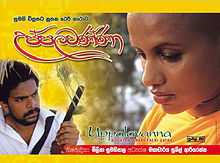Uppalawanna
| Uppalavanna | |
|---|---|
 | |
| Directed by | Sunil Ariyaratne |
| Produced by | Milina Sumathipala |
| Written by | Tissa Abeysekara |
| Starring |
Sangeetha Weeraratne Malini Fonseka Roshan Ravindra |
Release dates | 13 June 2007 |
| Country | Template:SRI LANKA |
| Language | Sinhala |
Uppalavanna is a 2007 Sri Lankan film starring Sangeetha Weeraratne, Malini Fonseka, Roshan Ravindra. It was directed by Sunil Ariyaratne.
Plot
Set during the 1987-89 JVP Insurrection, Ratnapala (Jagath Chaminda), a student at the University of Colombo and former member of the JVP, comes to visit his mother in Anuradhapura. He is killed by a former comrade (Roshan Ravindra) on the basis of leaking JVP secrets to the Sri Lankan government. The comrade sustains serious injuries from this encounter.
The comrade runs from the scene, attempting to make his way back to his base camp. Instead, he ends up near the Anuradhapura nunnery. Uppalavanna (Sangeetha Weeraratne) comes across him and after much deliberation, decides to heal him. Throughout the days she spends helping him, she reflects back on her time as Upali, a laywoman.
Upali, the daughter of an Ayurvedic doctor (Suminda Sirisena), fell in love with her dance teacher's son. They eloped, which caused her mother much pain and eventually, a premature death. Upali and her husband go to the funeral, and there, her father shoots him dead. Her father goes to jail, and Upali explains to him that she wants to repent for all of their sins by joining the nunnery.
This reflection coupled with her secret assistance changes how Uppalavanna acts. The chief nun (Malini Fonseka) senses this, warning Upallavanna with her namesake's story.
Eventually, the villagers find the assassin and take him away to kill him. Learning that he received medication from the nunnery, the villagers refuse to offer alms to the nunnery. Accepting the guilt unto herself and establishing the innocence of the other nuns, the film ends with Uppalavanna leaving the nunnery carrying only her alms-bowl.
Cast and characters
| Character | Played by |
|---|---|
| Uppalavanna/Upali | Sangeetha Weeraratne |
| Father | Suminda Sirisena |
| Dancing Teacher | Rohana Beddage |
| Insurgent | Roshan Ravindra |
| Undergraduate | Jagath Chamila |
| Chief of the Nuns | Malini Fonseka |
| Sandali | Pdo Atthi |
Reception
Critical
The movie was met with primarily negative reviews.[1][2] Many criticized the various unnecessary characters in the movie which do not have any role in the plot, the editing, and the acting. Sangeetha's performance was panned by some critics. The website Sri Lankan Film Critics,[3] gave her extremely negative reviews. Indeewara Thilakarathne and Ranga Chandrarathne commented on Malini Fonseka's inauthentic portrayal of the chief nun.
Indeewara Thilakarathne and Ranga Chandrarathne criticized the similarities of the movie with other movies which shared a similar theme like Water and Sankaran. They said -"Although one may not be able to pinpoint that the film has copied or rather adapted some scenes from Water or Sankara, it is doubtful whether the film maker had attempted to adapt some elements of Water in a Buddhist milieu. Especially the character of Podi Atthi remind the viewers of Chuiya in Water though it is not as lively as Chuiya.
The script and cinematography were highly praised by the critics. They said that these factors shed light to the film. Navaratne Gamage's music, Suminda Weerasinghe's cinematography and Nanda Malini's singing made a meaningful contribution to the film. Dr. Praneeth Abeyasundera with his melodious wording has attempted to capture the spirit of the tone of Buddhist chanting.
Commercial
Uppalavanna did fairly at the box office. Uppalavanna recorded the best returns in three years, during the first two weeks.[4] However
Awards
Sarasaviya Awards 2007
- Most Popular Actress - Sangeetha Weeraratne
- Best Actress - Sangeetha Weeraratne
- Best Supporting Actress - Chandani Senewiratne
- Best Music - Navaratne Gamage
References
- ↑ "Uppalavanna: A portray of real human values". The Daily News. Retrieved 16 January 2013.
|first1=missing|last1=in Authors list (help) - ↑ Silva, Chandana. "Uppalavanna depicts need for universal love". The Daily News. Retrieved 16 January 2013.
- ↑ "Uppalavanna". Sri Lanka Film Critics, Blogger. Retrieved 16 January 2013.
- ↑ "'Uppalavanna' - a human interest story well related". Sunday Times. Retrieved 16 January 2013.
|first1=missing|last1=in Authors list (help)